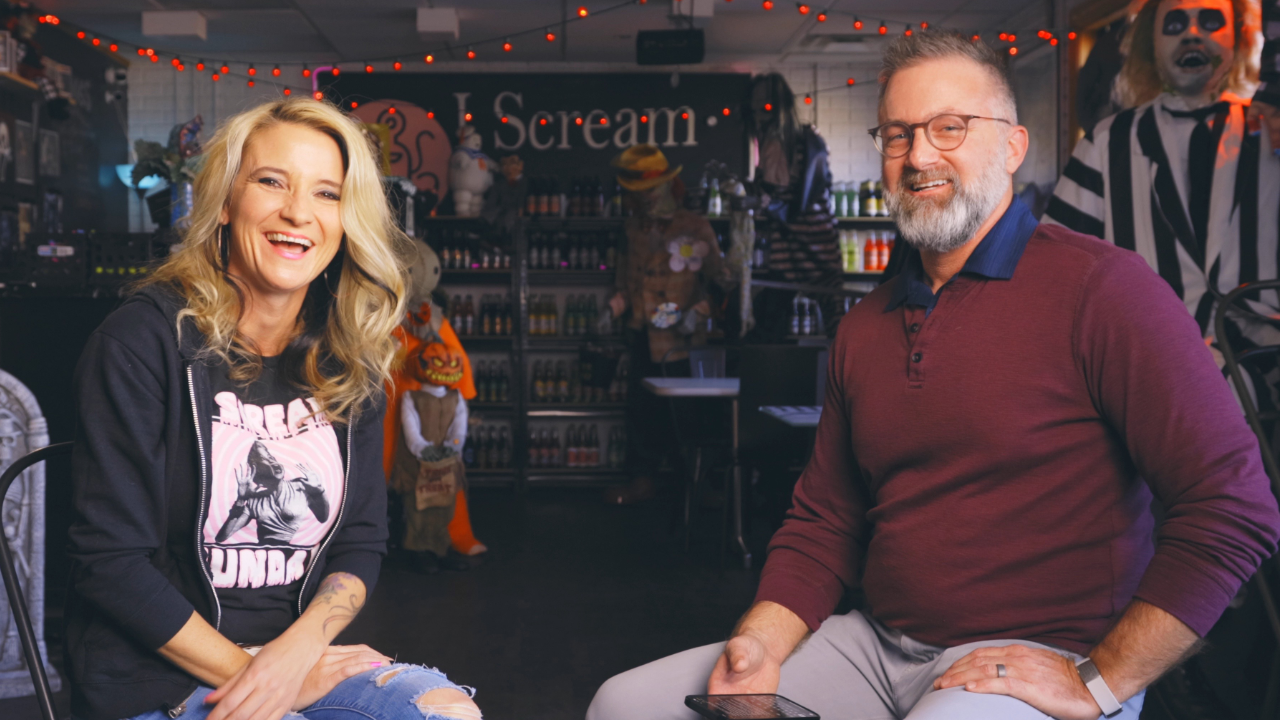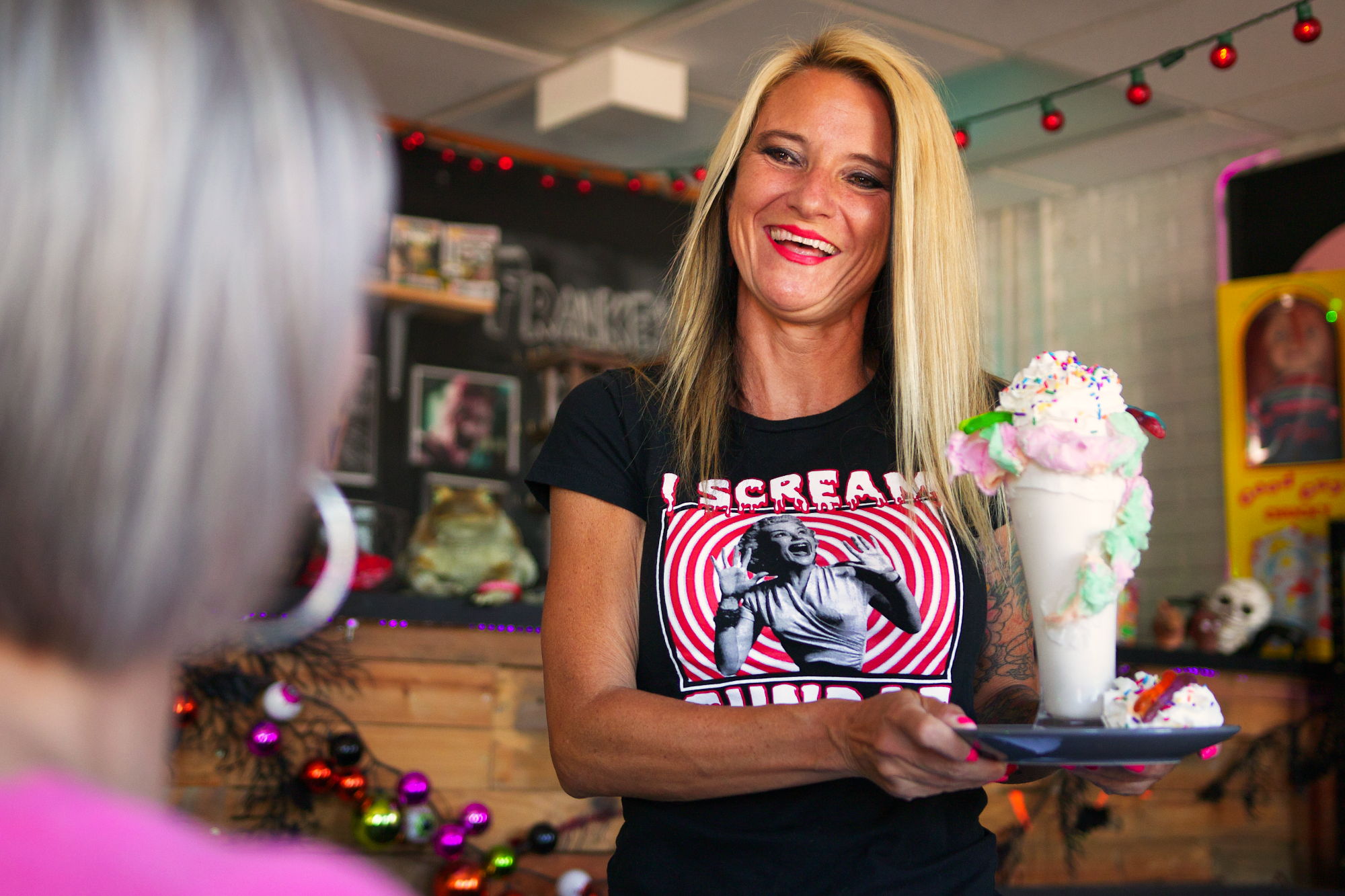Today I’m interviewing Charessa Wilkinson, serial entrepreneur and the mind behind I Scream Sundae.
In July 2019, ‘The Scream’ started as a local restaurant in Charessa’s small town. Now, it’s a national travel destination defined by its specialty ice cream, contagious kindness and horror theme.
“I come from a very long line of serial entrepreneurs, is what I call myself.”
Charessa: Absolutely.
Shandy: We’re trying to understand what it’s like to start a business or own a business, or we’re going to communicate your ideas to the effect that those who are on the fence of wanting to do a business. So what was the inspiration in starting I Scream Sundae?
Charessa: I Scream Sundae. Ok, I come from a very long line of serial entrepreneurs, is what I call myself. My great grandfather started the Tyler Mountain bus line in Cross Lanes. My parents do a travel company. And so, it’s only natural that me and my sister, we kind of transitioned into that and we did Sold Sisters Realty first together. And then out of that, we bought a building. That’s where we are right now. And then I have a lot of teenagers and I love teenagers. That’s my heart is teenagers and young adults, so that’s what I wanted to attract.
Shandy: I gotcha.
Charessa: So, I did a haunted house.
Shandy: So, the haunted house was prior to opening I Scream?
Charessa: Absolutely. That’s how this creation was born. So that’s what happened is that we did the Go Go Scare Show. At the end, I felt really sad because I absolutely loved these kids and loved these young adults, and I thought, how can I make this continue? So, the way to do that was, I had a whole haunted house, and then I had these kids, and everybody loves ice cream. So, we put the haunted house and stuffed Halloween and ice cream together and became I Scream Sundae.
Charessa: And now I’m able to employ these young adults to teach them business, to teach them entrepreneurship, to teach them responsibility. I mean, I went overseas was gone two weeks and put a 17-year-old in charge.
Shandy: And in my case, when you put somebody young in charge, it really gives them a chance to think out for themselves.
Charessa: Yes.
Shandy: And you can trust them to a point and you was able to do that in this situation right now.
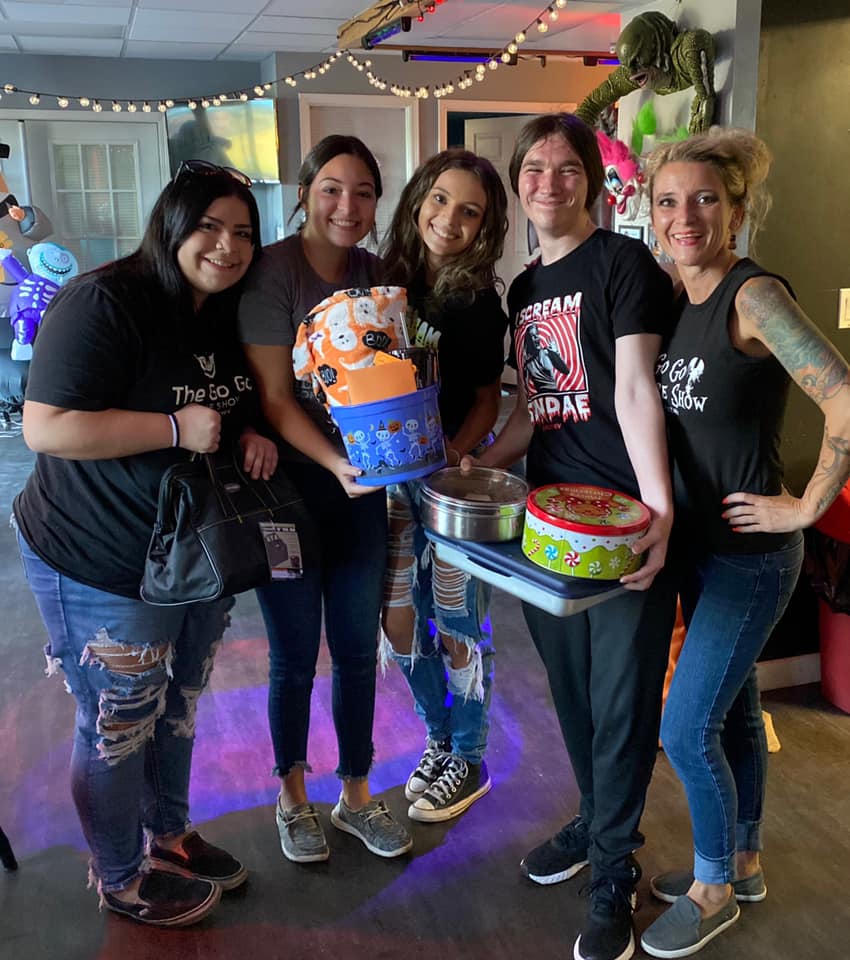
Shandy: Talking about challenges in starting a business, if you can share with somebody, what in the world, like when you started the Go-Go, that was probably more of a weekend kind of thing. But like when you took off with some of your other businesses, but specifically I Scream Sundae, what was, like, the hurdle? What was the challenge? Was there any mental gymnastics that you had to overcome?
Charessa: So, what’s funny about any business that I’ve ever done is I’ve never had a plan.
Shandy: Oh.
Charessa: Ever! No plan.
Shandy: Your banker or your accountant may not like that.
Charessa: I’ve never taken a loan out with anything. I’ve never. I said, this is this is how we’re going to do things check it off, nothing. Even with The Scream, I call it ‘The Scream’ for short.
Shandy: Gotcha.
Charessa: But we built this completely and everything was just in my head. We hadn’t even created the first Creation Milkshake at all. It was just like, I think I can do this.
“I remember crying a lot.”
Charessa: So, I remember crying a lot.
Shandy: So, wait a minute. Wait a minute. You’re happy. Excited. Ok, you wanted to start this new business. Now you’re- now you’re crying?
Charessa: Yeah, because I didn’t figure out how to do the milkshakes before.
Shandy: So, wait a minute, you’re looking for a grand opening and you don’t know how to make a milkshake?
Charessa: I have no idea. It’s just like, this is what’s in my head. So, what happened is that my (daughter) she was 14 at the time and I started crying and she’s like, ‘Mom, I got this.’ And she made the first Creation. It was the Pink Potion. Strawberry. And then we had some strawberry icing and we had cotton candy and it was just really simple. But once I could grasp ‘that’s how you do it’, then we just took off.
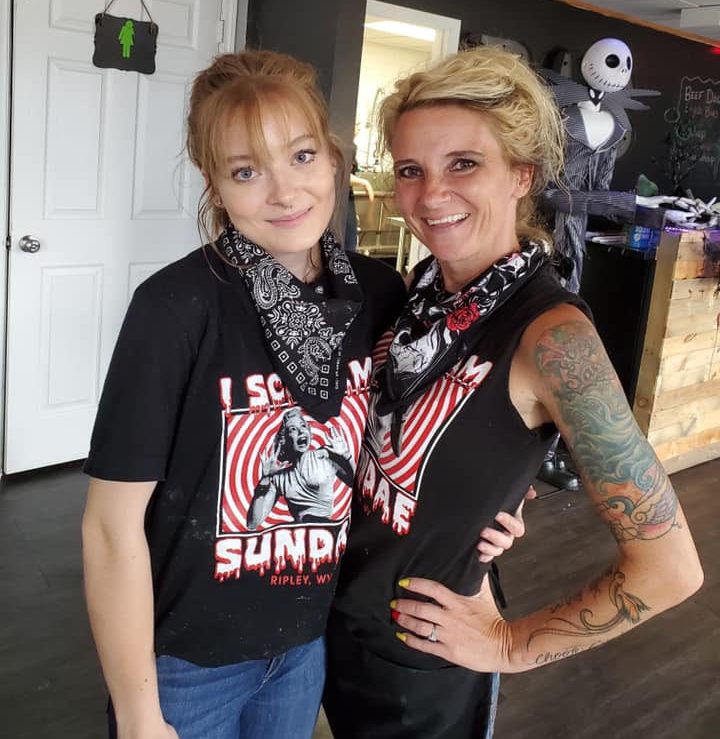

Shandy: Did you have like a like a soft opening or a test panel that said, let’s test these out. You just went full public. That’s what I do.
Charessa: I think you were here.
Shandy: I was.
Charessa: Oh, yeah.
Shandy: But I didn’t realize that was the genesis of everything. Yes, that was just, let’s just open the doors and see what happens.
Charessa: Yeah.
Shandy: So, you’re a bold step taker?
Charessa: Extremely.
Shandy: Whereas some people were real cautious, they want to think everything out, get their ducks in a row. But with Charessa, this is like her- her way of doing things, which honestly, we can all learn something. It’s like, the fear is overcome the quickest when you start stepping the fastest. Would that be safe to say?
Charessa: Oh absolutely.
Shandy: Ok.
Charessa: Yeah. But it’s not for everybody.
Shandy: No, I agree with that.
Charessa: And not only that, but I had the safety net of Sold Sisters too.
Shandy: Sure. So, you’re starting a spin-off of your other companies, which you’ve kind of gone through the challenges of the startups from the very first one. Let’s go back to that one. I know we’re coming off the topic of I Scream, but let’s just generalize the first business here. Was it tougher than I Scream?
Charessa: Oh my gosh, it was so tough. Yeah, yeah, Sold Sisters. We actually started off in not half a double-wide, a third of a double wide. Just a third. And that’s where we started. And still, that was like too much to do. I mean, it’s like $200 a month.
Shandy: And whether you’re going to make it or not is like the scariest thought, right?
Charessa: Yeah. But we didn’t really have any choice and I didn’t sleep, me and my sister, for about a year and a half. It was so hard.
Shandy: Just as nervous as can be?
Charessa: You know, working, just working, working, working, working, working. And when you’re doing real estate, it’s more about- you had to be out there, and you have to be marketing yourself out there. So, what we did, me and my sister, was that we- it was grassroots marketing. It was so hard because we actually put shirts that said, ‘Ask me how to buy or sell’ and walked around Junior, the fairgrounds, Wal-Mart, feed stores. We made jewelry and we went to these craft shows and all these elementary schools and said, ‘You want to buy a necklace? Do you want to buy a house?’ And that’s how we did it.

Shandy: One or the other? A necklace or a house? That’s interesting. Anybody in the real estate there may be a topic or a pointer there.
Charessa: Yeah. Well, the necklace though got us into the craft show, which got us in front of people.
Shandy: So, you’re doing something, I mean, completely out of the box, which is what I love about risk-takers, entrepreneurs in general. You know, you don’t always have to be a copycat. You don’t always have to do the same thing everybody else is doing. And we were speaking of this before we got on camera, but I want you to know that outside of the box is really thinking different than anybody ever thought of that brings your personality into that concept.
Charessa: We did things differently. Yeah. And that was- and we were, I think, a breath of fresh air.
Shandy: So, would you say that you shook the tree?
Charessa: Yes, a little bit, yes. And it improved everybody, I think.
Shandy: I think so too. I think if you’re willing to do something different, I think it really helps those that may be even a competition. If you’re shaking things up, that maybe makes them rethink their business, that they need to compete with you or they need to get on their game, you’re really helping all ships rise in a situation like that. As long as you’re not slandering the other business always, you’re not trying to cut them out of the whole market completely with unethical moves, you’re just doing your thing.
Charessa: Exactly. And I think it improved the quality of service and all for Jackson County with all the companies.
“I love the small town, I love the community feeling, I love the support.”
Shandy: From people who ask me, it’s like, ‘Well how do you make it in a small town?’ Well, I think, and this may resonate with you, as we bring what we see in other places that we visit back to our hometown and then we expand on that. There is no reason that we can’t own and operate our business here and then take it out to the world, rather than trying to go find some bigger city where there’s more people or there’s more things to do or whatever. It’s just the fact that you do with what you’ve got right where you’re at.
Charessa: Absolutely. And I’ve been told so many times that we would be so big with our marketing if we even if we are somewhere else. But that’s not who we are.
Shandy: So why would you not go?
Charessa: No because I love the small town. I Love the community feeling. I love the support.
Charessa: You’re going to get me emotional. I don’t think that what happened to us could have happened to us if we wouldn’t have started here in Ripley.
Shandy: You didn’t have any other reason to want to be anywhere else than here?
Charessa: I am going to get into this God thing, too, because that’s the way that my world works. We were supposed to build a house in Cross Lanes. The day before closing, I felt like God told us ‘No, move to Ripley.’ I called my one friend. I said, ‘God told me to move Ripley. I guess that’s what I’m going to do.’ And the house that I got was three times the size I was going to buy, Appalachian log structures home, just like I was going to build, for a third of the money. And that was 17 years ago.
Shandy: This is a very important piece right here because I feel the same way. You know, I pray about every step that we take, every move that we make is definitely calculated, not necessarily mathematically or through market strategies, it’s usually very quiet times alone. Whenever we struggle, the most is whenever I pray the hardest, and it usually yields the worst outcome right after that to test us, to- I guess it’s like a testing period for us, that things that seem to not want to come together, then all of a sudden it just blossoms into this new thing. Yeah, and I think that’s hugely important.
Charessa: Yeah.
“I’ve been told so many times that I am a franchise.”
Shandy: So, all right. So now you’re past the beginnings. You’ve worked your rear-end off. Yes, in this new location in small town. You’re basically in your mind, you’re coming up with some kind of concept and you’re putting flesh on it. Basically, the idea.
Charessa: Or taking flesh off in this point with the zombies.
Shandy: Yes. I want to know why is it important to do a good logo design? Why is it important to have your facility look like it does? What does that mean to the public? What does that mean to you?
Charessa: Well, I’ve been told so many times that I am a franchise.
Shandy: You look like one.
Charessa: I know I’m like, no, this is all came out of my head.
Shandy: So how does that happen? Like because I’ve seen people–
Charessa: Quality! Quality! Quality!
Shandy: There it is.
Charessa: I mean, absolutely from the decor to the way that you are greeted at the door, to the way you are served throughout it, to the logo, to the shirts, to the quality of ice cream. I was telling Shandy it’s $12 wholesale a gallon for my ice cream.
Shandy: But you’re paying for the best?
Charessa: Yeah.
Shandy: To give them the best.
Charessa: Yes, because this isn’t just like a novelty or, you know, like, ‘Oh, let’s try this one time and then let’s go.’ So, we get repeat, repeat people that are so excited for us to open up, and they travel two to three hours easily to come here.
Shandy: All right. So, first impression is everything. Quality gives the best first impression. How important do you think that connecting with your customer base is? And what does that mean to somebody when you trying to convey your idea, but you want them to take something with them, as it is that I’m trying to say, is the emotional connection happening for you?
Charessa: Everything that I do is all people driven. Everything. So, part of it, too, is the t-shirts we are designing, we’re talking about. And that’s been like, this weird thing that’s come out of all this is that we’re starting to be known for our t-shirts. People are collecting every color of the same shirt that Swiftees prints for us.
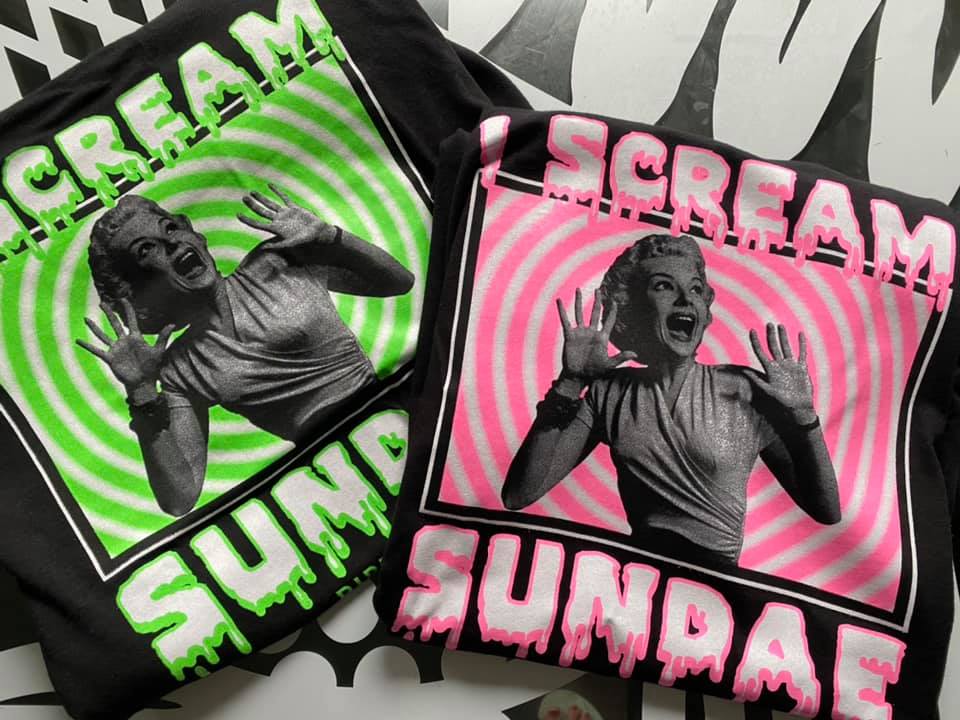
Shandy: Thanks for the plug.
Charessa: Yeah, but that also makes them feel like they are part of us, and part of our Haunt Family is what we call.
Shandy: Haunt Family?
Charessa: Yeah, we’re a Haunt Family, and so we see these shirts out, you know, in public and they’re like, ‘Oh yeah, oh yeah!’ So that’s really cool.
Shandy: So, they feel connected.
Charessa: Absolutely.
Shandy: Do you think it’s better for them to feel connected or do you think it’s better for somebody like you just to sell them ice cream and push them on their way?
Charessa: No, not, no. I mean, the biggest story that we had once was probably a year or two ago. And the 16-year-old, from Delaware, her dream was to come to I Scream Sundae.
Shandy: That’s amazing. Holy Smokes.
Charessa: No, no, no, no! They packed up. They went and got grandma out of the nursing home. Yes.
Shandy: From Delaware?
Charessa: From Delaware.
Shandy: Grandma is coming out of the nursing home to come–
Charessa: –to come to The Scream.
Shandy: Oh my gosh.
Charessa: Yeah.
Shandy: Why?
Charessa: Because this was what this girl’s dream was. This is what she wanted for her birthday. So, her family made it happen.
Shandy: So, the Delaware people came down. You were like, blown away.
Charessa: Absolutely.
Shandy: So, did you just spend some time with them?
Charessa: Oh my gosh, yes. Oh yes, oh, I went over and beyond yeah. I was like, Oh yeah.
Shandy: Here, take it free this or whatever.
Charessa: I do that. I give t-shirts away. That’s why I have bracelets so that, I want somebody, everybody to take home something.
Shandy: That take home thing, that’s my wife’s, my business partner, my wife. She says, ‘Somebody has to leave our facility with information, a sample, something.’ We do something a little different than ice cream, but it’s the same part. You want them to feel like they’ve got what they need when they leave.
Charessa: Yeah. Yes, exactly. And then they have that and they’re laying it around their house or whatever, and they’re wearing them to it. And they’ll remember.
Shandy: Connecting with your audience, connecting with your brand, connecting with your customers is probably a huge thing that people sometimes overlook when they’re starting a business. It’s not so much about me, me, me. It’s got to be about those you’re serving.
Charessa: Absolutely.
Shandy: In this case, I think this example right here is probably best told in her stories from the people coming from Delaware. So do not underestimate the power of giving your best to those that are helping you.
Charessa: Yes.
“We have created kind of a cult following.”
Shandy: Ok, so one last question. Your brand recognition has become a real interesting following. As far as customers, they just recognize it. They understand it in the community. They understand what it is.
Charessa: And from outside the community.
Shandy: Delaware, across the United States, wherever there’s some somebody connected with you on a regular basis and looking forward to the next roll-out of a branded shirt or whatever.
Charessa: Or a new Creation.
Shandy: We want to know why you think you have that kind of connection with your audience?
Charessa: Ok, so The Scream is a destination. That’s what it is. It’s not necessarily a local kind of thing. But we do have a lot of huge fans that come in and we have created kind of a cult following. But our people too, which I didn’t expect this but of course you got the alternative, you got the punk rockers, you got that kind. Which, I mean, warms my heart because they feel like there is a place now where they can come, they can come dressed up and feel like themselves and be accepted and be loved.
Shandy: Which is huge in any culture, no matter what you’re doing.
Charessa: Absolutely. But then we also have these families and so people can bring their kids and they can be loved on and supported and, you know, and have a great time. We sing songs, you know, whatever it is. Yeah. But then you’ve also got older people because they love ice cream.
Shandy: So, you got you got them all covered? All bases covered.
Charessa: You would think so, but I mean, those are the three demographics that come in here.
Shandy: So, is it from consistency? Is it from acceptance? Is it being open on a consistent basis?
Charessa: It’s the consistency. I mean, we’re horror themed, so that is an easy thing to keep going through the decor, through the Creations, through the merchandise, through the t-shirts, through, you know, a lot of different things. So that’s easy. And then, yeah, we get the different dynamics, too.

Shandy: So, culture means everything to your customer base?
Charessa: Oh, yeah.
Shandy: And they love coming back?
Charessa: Yes.
Shandy: And the ice cream’s good?
Charessa: Yes, our hotdogs are good. Real estate’s good.
Shandy: The coffee shop’s good.
Charessa: Yeah, it’s all good. It’s all good. And then on the next.
Shandy: Well, good. Well, we appreciate your time.
Charessa: Appreciate you, Shandy.
Shandy: Thank you so much, I appreciate you.
Charessa: You’re welcome.
Common Threads is a series of discussions between our CEO, Shandy Broom, and other business owners, entrepeneurs and collaborators of Swiftees, with the aim of inspiring and helping both experienced and first-time business owners.
Learn more about Charessa and I Scream Sundae by visiting their Facebook page.

